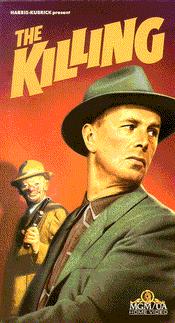
The Killing (1956)

This Kubrick film noir production has become a cult film, a methodical, cleanly directed movie that ruthlessly chronicles the robbery of a racetrack, not dissimilar in mood and structure to The Asphalt Jungle (1950). Hayden is an ex-con who tells his childhood sweetheart Gray that he and a few others are going to make a big score, and it will be his last caper. Hayden; Flippen, a retired friend; De Corsia, a cop who owes the syndicate money; Sawyer, a bartender at the racetrack who needs money for his sick wife; and Cook, a cashier at the track with a money-grubbing wife (Windsor), all meet to plan the robbery.
Kubrick examines the lives of all of them before the caper, depicting them as ordinary people with problems that are getting too big for them to handle. Windsor actually compels her meek-mannered husband Cook to go through with the theft even though he wants to back out, so she can live in luxury. During the seventh race, the gang plans to loot the money room where the betting take is kept, and Carey, a brutal killer, is to shoot one of the horses on the far turn to create a diversion. The men break in during the race and quickly stuff stacks of bills into sacks and toss them out of a window to De Corsia who puts them into his patrol car and drives off. Carey kills the horse but is himself killed by a suspicious guard whom Carey had earlier insulted.
Following the robbery, the gang members wait for Hayden to bring the money for the split-up, but Edwards, Windsor's lover, shoots them all and is himself killed in the gun battle. Cook survives long enough to stagger home and shoot Windsor, then falls dead over her corpse. Hayden goes to a motel room he has earlier rented and picks up the money which De Corsia has placed there. Knowing of the shootout, Hayden packs the money in a suitcase, and he and Gray go the airport. There, a bumbling porter drops the suitcase, which bursts open, and the money goes flying across the runway while Hayden and Gray stand in shock watching their fortune vanish. "What's the difference," shrugs the fatalistic Hayden. He mutely stands there and allows the approaching police to arrest him.
This was Kubrick's third film, the first two being Fear and Desire (1953) and Killer's Kiss (1955), both miserable little films shot on miniscule budgets (about $40,000 each). The Killing brought Kubrick to the attention of the industry as a major directorial talent even though this film was also produced on a small budget of $320,000, and it shows. The sets are like cardboard, but Kubrick emphasizes the fact, panning his camera from one room to another, showing partitions, devising every conceivable angle from which to shoot, so the space in which his actors move appears as it really is, confining, cramped, and claustrophobic, reflecting the attitudes of his characters.
Kubrick stated later that he was influenced by French director ,Max Ophuls and it's obvious in his fluid camerawork; the story is a visual treat, unraveled in truck, dolly, and pan shots, mostly medium set-ups to include most of the main characters and reinforce the image of the gang. There is a documentary feel to the movie, which was superbly edited by Steinberg (undoubtedly with Kubrick standing over her shoulder since he feels that editing is one of the most vital responsibilities in filmmaking). Hayden is stoical but top drawer as the nominal leader of this unprofessional gang of thieves. Cook gives one of the best performances of his life as the henpecked little man who suffers an avalanche of insults from his wretched wife, Windsor, whose own performance is spectacular.
Cast:
Performer, Character
Sterling Hayden, Johnny Clay
Coleen Gray, Fay
Vince Edwards, Val Cannon
Jay C. Flippen, Marvin Unger
Marie Windsor, Sherry Peatty
Ted De Corsia, Randy Kennan
Elisha Cook Jr., George Peatty
Joseph Sawyer, Mike O'Reilly
Timothy Carey, Nikki Arane
Jay Adler, Leo Joseph Turkel
Tiny Maurice, Oboukhoff Kola
Production Credits:
Producer, James B. Harris
Director, Stanley Kubrick
Screenwriters, Stanley Kubrick and Jim Thompson (based on the novel Clean Break by Lionel White)
Editor, Betty Steinberg
Cinematographer, Lucien Ballard
Composer, Gerald Fried